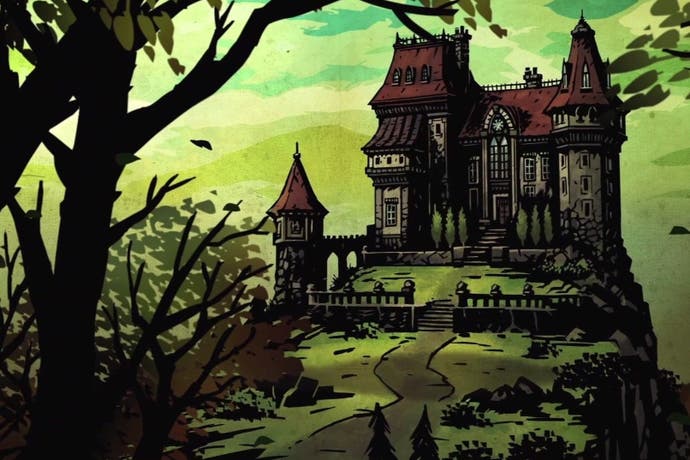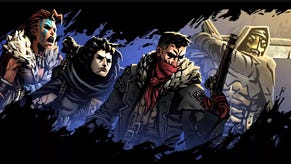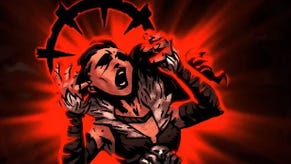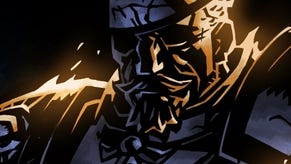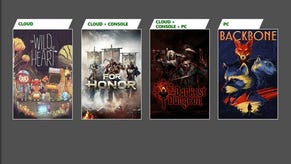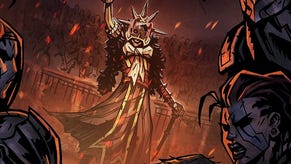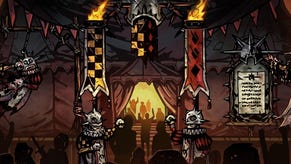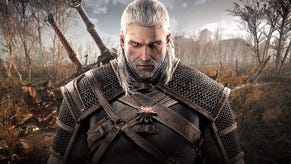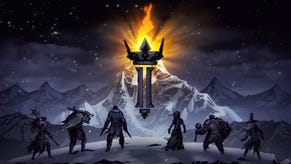Darkest Dungeon might not be fun, but it is fascinating
No mourned heroes.
When a suicidally depressed leper is your party's healer, you've got problems.
Darkest Dungeon is the antidote to all those cheery heroics in other games. You think it'd be fun, actually going into the bowels of the Earth and fighting undead hordes, slobbering maggots, giant spiders, and your own mortal fears. Not so much. It's a game of fighting evil, yes, but also depression, mental collapse, and fear of both the dark and the fear of the unknown, all wrapped into a simple side-scrolling RPG made no less morbid by smacking somewhat of more pleasant games like Bookworm Adventures and Mario and Luigi. It's a place where the traditional trinity of tank, healer and DPS really needs a fourth member, therapist, for those moments when the healer suddenly decides that pain is fascinating, or becomes masochistic enough to demand the monsters give them their share of agony.
All of this isn't simply a little aesthetic flavour, but a big reason that Darkest Dungeon works so well. It's morbid, but not without a sense of dark glee, balancing a world that makes Diablo's look like Center Parcs with a presentation that makes it fun to explore. The snarling character portraits. The deliciously hammy narration. The increasingly insane hollerings from your team as they go from variably heroic hopefuls to broken husks. In a game like XCOM, it's common sense that everyone should stay alive, that they might get stronger and better.That's largely true here too, in that time and experience can hone even the simplest jester from a feral opportunist with a talent for sticking in the knife to a slobbering killing machine.
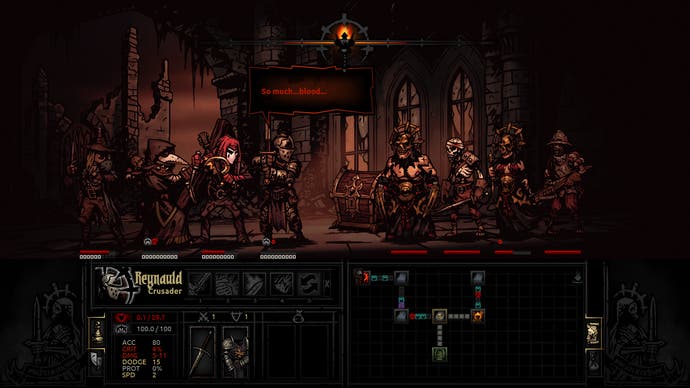
Every experience leaves scars though, until what's left are less heroes than questing husks just waiting to lose themselves in a brothel. You can pay to remove flaws, though this feels like a mistake that detracts heavily from the point of the game, but mostly you just have to deal with them. If your best guy is an open sexual deviant banned from anywhere who can help him recover, well, sucks to be him. There's always more fresh meat rolling into town. Even while alive though, the heroes can often be their own worst enemies. Each one has not just a health bar, but a stress one, built by trauma and terror as you'd expect. Cue skills like "Defy The Gods" in which one character will cheer themselves up by spitting in their face, at the expense of everyone else, or the Jester's Mockery, where three members of the party have a good laugh at the fourth's expense, making them feel as worse as the rest suddenly feel better.
Without all this, I doubt Darkest Dungeon would be half as appealing. The actual action is somewhat simple and very repetitive, and hopefully will sprinkle in a little more on the exploration side before launch. At the very least, it needs a lot more scripted comments, since right now you can often be sitting around just seeing the same quips again and again and again. That's both boring, because they get old, and annoying, because it often means sitting around for pointless seconds between the already slow turn-based combat rounds. The same goes for the needless pauses after enemies announce their attacks and the needless counting of rounds, as if anyone cares or it couldn't be put above the torch meter if they do.
When fighting is the bulk of what you do, it needs to be as slick and carefully paced as possible. Visually, it is, with the 2D papercraft characters delivering brutal and dynamic blows with just a couple of frames of animation. As with much of Darkest Dungeon, the attention to detail is sublime - a particularly cool detail being the slight tilt of the camera to denote combat turns. The timing issues are a rare case where its push for a lugubrious mood goes too far.
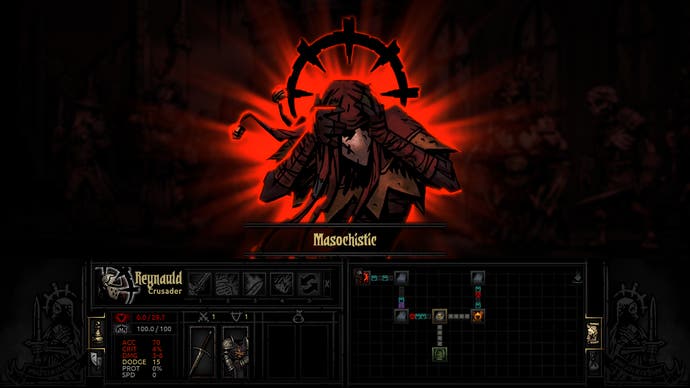
The combat plays in largely typical JRPG style, but is a good deal more complex than it looks. Classes have favoured positions and enemies that aren't simply 'tanks in the front, damage at the back'. Skills depend on current position in line, shifting abilities, targets and skills in a way that isn't immediately clear but is always critical for success. On top, you're expected to hit the ground running when it comes to things like buffs and debuffs, combos like the Bounty Hunter marking an enemy for death before delivering his main attack (but the mark still working for anyone else with an ability that can use it), and heroes who are painfully, painfully under-equipped and ill-prepared for fighting anything more than a pacifistic moth. A small one. Most are only passably heroic at best, with a couple like Crusader on the hero side, but others including Highwayman, Grave Robber, and the aforementioned Leper, whose skills all stem from his life of misery. No wonder he just wants to get legless in the tavern.
Making it tougher is that your available party is a mishmash of what the random number god chooses to send you and who is still standing after dungeon dives. If that's a well-balanced team in perfect sync, fantastic. More likely though, it's going to be something like a couple of feral Jesters with their daggers, and two Vestals. Between missions, the stress and pains inflicted also means characters having to sit out and recover by getting on their knees in the abbey or having someone else get on theirs at the brothel, forcing someone else to be swapped in to take their place. On top of all this, you have to pay your way through the dungeon with food and light and other items, and balance a decent number of trade-offs. Adventuring in the dark, for instance, is a major disadvantage, but the risk does come with extra rewards.
Every dungeon is a randomly generated mix of rooms and corridors, mostly full of monsters. You walk from left to right and take them as they come, with most cleared rooms offering a couple of path choices. Roguelike then, but in the bits I've played, lacking the variety to make exploration exciting or routinely surprise with new things and interesting combinations of what came before. Instead, it's more like a conveyor belt rigged to drop an almost endless supply of horse manure on your team's heads. Not exclusively. Sometimes there's traps, sometimes treasure to both your heroes and the town above the dungeon, sometimes a trinket or shrine or similar to help out, or a suitable spot to camp and use survival skills.
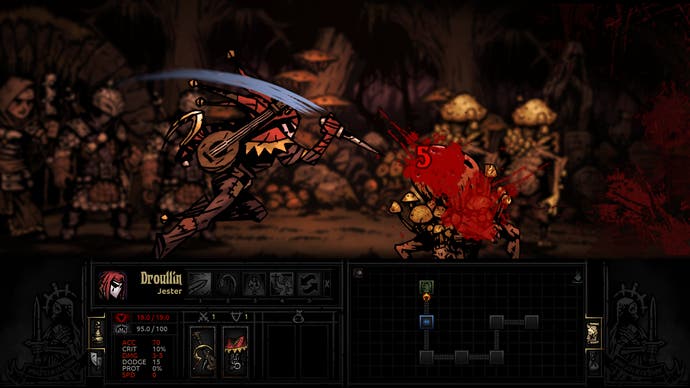
Mostly though, you can be sure that every door leads to combat. Your team lines up on the left, the enemies line up on the right, and for a good long while mostly consists of your faces being stomped into the mud by their boots. Darkest Dungeon warns up front that you'll crumble fast, and it's not kidding. This dungeon doesn't need cells, because it takes no prisoners. There's just the briefest tutorial, then the pain begins. The only real favour it does after that is that your heroes don't die simply for losing their health points. Instead they end up at Death's Door and only fall when their random dice rolls let them down. After that though, they're gone, history, worm food, riding the Permadeath Express.
My main concern with Darkest Dungeon is that while I've been having a great time with it, far more of that is based on the aesthetics and the ideas than much of the actual combat. If you get hooked on it, the finished thing is going to have plenty of it (at the moment the final dungeons haven't been implemented, and honestly there being no way to actually win seems deeply appropriate). I suspect, though, that once into the rhythm of the combat, it's going to wear out its welcome far faster than other roguelikes. The trick to a great one is having lots of mechanics that intertwine in interesting, previously unseen ways. Darkest Dungeon, so far at least, is far more geared around offering mechanical complexities and handicaps. I'm not convinced learning the ropes and then grinding to competence is going to carry things quite long enough once the charm of the style, premise and gorgeous atmosphere wears off.
In the short term at least, those positive attributes shouldn't be underestimated. Darkest Dungeon is certainly one of the more interesting Early Access games so far this year, and it's lovingly polished, engineered, and feels every bit a game rather than an alpha. If you didn't see the occasional signposts of missing content, notably the Darkest Dungeon itself, you'd swear it was finished. As is, there's still a bit of time left to go, which will hopefully at least partly be spent both further polishing the already extremely compelling core, and rounding out the content to make each delve as delightfully unpleasant and unpredictable as it deserves.
